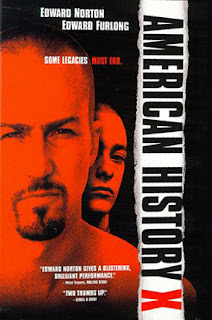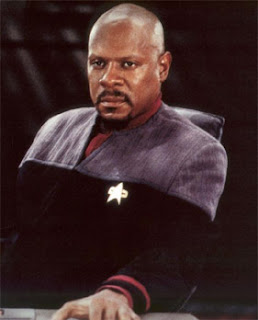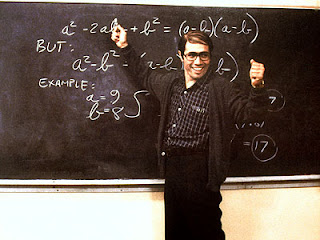Avery Brooks in American History X
American History X is, admittedly, an odd choice to highlight excellent teaching. The film is less about student-teacher bonding than it is about racism, prison, and family.
 And goatees. Immaculately trimmed goatees.
And goatees. Immaculately trimmed goatees.Still, of all the teachers in film, Avery Brooks’ Dr. Bob Sweeney is probably the most determined, without being sappy. In the timeline set up in the film he begins mentoring a bright, impressionable young man named Derek, only to see him become a die-hard skinhead after the death of his slightly more subtly racist father.
 Derek‘s father in happier times.
Derek‘s father in happier times.
Many educators would consider Derek a lost cause and move on to other, less swastika-covered students. But not Sweeney. Besides determination, Dr. Sweeney has another vital skill for teaching: knowing when your student is ready to learn.
Although it’s implied that they have little if any relationship over the next three years, when Derek is violently raped by fellow skinheads in the prison showers, Dr. Sweeney shows up in the infirmary, ready to pick right up where he left off mentoring Derek. That takes balls. Being a black man trying to turn a skinhead’s life around is tough on its own, but opening things up right after a shower rape, before the attackers have even toweled off? That is one insistent high school principal.
 Avery James also played Captain Benjamin Sisko on Star Trek: Deep Space Nine. In case you haven’t guessed, this film is filled with distracting casting choices.
Avery James also played Captain Benjamin Sisko on Star Trek: Deep Space Nine. In case you haven’t guessed, this film is filled with distracting casting choices.The main reason Dr. Sweeney doesn’t get more credit for his role in this film is probably because for such a stirring indictment of neo-Nazism, American History X has a pretty ambiguous ending. One could be left with the message that the cycle of racism and violence is too entrenched, and for all of Dr. Sweeney’s good intentions, humanity is too flawed to ever live up to his teachings. Still, his character shows the kind of passion and emotion that is so lacking in real teachers, and so often comically overdone in film teachers. For that, I salute you, Dr. Sweeney.
 I also salute Fairuza Balk’s Character Stacey, but for significantly less honorable reasons.
I also salute Fairuza Balk’s Character Stacey, but for significantly less honorable reasons.The Bad:
Edward James Olmos in Stand and Deliver
Wait a minute, the movie about neo-Nazis played by the cast of Boy Meets World gets a thumbs up and the true story of inner city youths learning calculus from Edward James Olmos, the lord of inspirational Latino filmmaking, gets criticized? Well, yes. And here’s why: While Stand and Deliver is inspiring and is based very closely on the factual events of Jaime Escalante teaching math in East Los Angeles, this film is the basis for every similar hackneyed story since. A teacher who doesn’t play by the rules? Check. Intellectually comatose, “slipped through the cracks” students? Check. An all-or-nothing climax? Check.
 A poster that couldn’t be more ‘80s if it were wearing Zubaz? Double check.
A poster that couldn’t be more ‘80s if it were wearing Zubaz? Double check.This movie is sincere, and stuck to the truth, and was, at the time, original. But you know who else was sincere, factual, and original? Woodrow Wilson.
Poor Woodrow Wilson. He tried so hard and meant so much good, but ultimately all of his thoughtful ideas and passionate progressive beliefs led the way to World War II. Could Wilson have known the complications inherent to his ideas would create a place for someone as terrible as Adolf Hitler? Of course not. But the fact remains that but for the Wilson presidency many of the worst events in world history may well have never happened. Stand and Deliver is Woodrow Wilson.
Sure, Stand and Deliver never meant for cinematic tragedies like Precious, Dead Poets Society, and Dangerous Minds to spring from its mold. But that fact remains that but for Stand and Deliver’s example, these films and many others like them would never have existed and the world would be a less terrible place.
 Also, I wouldn’t have just shat myself upon finding this picture.
Also, I wouldn’t have just shat myself upon finding this picture.Sadly, the only thing damning Stand and Deliver is its legacy. Of all the terrible films recommended to my Facebook friend, this was the only one she immediately and violently shot down.
I quote:
“omg no Stand and Deliver, I was always angry when we had a sub in math and we had to watch it.”
This sentiment has been echoed by several people who had similar experiences with this film, over and over again. This means not only did Stand and Deliver lead to countless unoriginal, false-expectation inflating, saccharin knock-offs, but it actually made real life math teachers worse at their job.
 Stand and Deliver: Teaching calculus and irony since 1988.
Stand and Deliver: Teaching calculus and irony since 1988.That’s all for this list. Agree? Disagree? Something I missed? Let me know in the comments below and come back next week when I’ll be starting a new topic: Bodily Injuries I’ve Suffered and the Embarrassing Stories Behind Them. Hopefully it will be a learning experience for us all.







.jpg)










